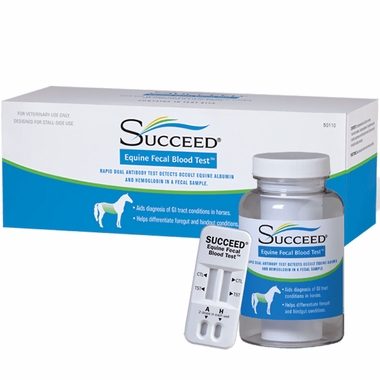Licensed U.S. Pet Pharmacy | Verified Pharmacy
SAVE 20% OFF 20% OFF Use Code PREZ20 *

Succeed Equine Fecal Blood Test (10 Pack)
Item# 34447
FREE SHIPPING Over $79! * Pet Food & Other Exclusions
- Description
- Directions
- Reviews
Description
The Succeed® Equine Fecal Blood Test™ will tell you in about ten minutes if your horse has a digestive tract condition. Proprietary SmartSignal Technology in the SUCCEED® FBT detects occult blood-minute amounts of blood undectable to the naked eye-in the horse's manure as a sign of digestive tract ailments, including ulcers.
Contents:
Contains one complete SUCCEED® equine fecal occult blood test, including:1 clea plastic container
1 dual trest cassette- contains both an albumin test (Test A) and a hemoglobin test (Test H)
1 disposable sample pipette
1 polyethylene glove
1 instruction sheet
1 desiccant pouch (for moisture)
Intended Use The SUCCEED® Equine Fecal Blood Test™ (FBT) is a qualitative lateral-flow rapid test that detects horse hemoglobin and albumin in equine fecal specimens. The SUCCEED FBT is for veterinary use only, for use as a diagnostic aid in assessing GI tract conditions in their equine patients.
Benefits of Testing First and regularly with the FBT
Monitor ongoing digestive wellness. The FBT provides a non-invasice and inexpensive way for your veterinarian to regularly evaluate a hor's digestive wellness - catching minor problems before they become serious issues. It may also be used to monitor progress after surgery or during treatment for GI conditions and other health problems that may impact gut health.
Detect gut issues earlier. Some horses are stoic and don't display the classic signs of digestive discomfort, while others may be suffering from low-grade hindgut inflammation that negatively impacts behavior and performance. The FBT is calibrated to detect true pathologies - but with the sensitivity to pick up subclinical hindgut issues early.
Diagnose problems more quickly and accurately. Digestive disease in horses encompasses much more than just the commonly recognized gastric ulcers, including ulcers in the colon and other hindgut problems. Because the structure and function of the fore- and hinguts are very different, they require targeted, localized treatments to be most effective – and avoid further exacerbating issues. Accurate diagnosis is critical for restoring health.
Contents:
Contains one complete SUCCEED® equine fecal occult blood test, including:
Intended Use The SUCCEED® Equine Fecal Blood Test™ (FBT) is a qualitative lateral-flow rapid test that detects horse hemoglobin and albumin in equine fecal specimens. The SUCCEED FBT is for veterinary use only, for use as a diagnostic aid in assessing GI tract conditions in their equine patients.
Benefits of Testing First and regularly with the FBT
Monitor ongoing digestive wellness. The FBT provides a non-invasice and inexpensive way for your veterinarian to regularly evaluate a hor's digestive wellness - catching minor problems before they become serious issues. It may also be used to monitor progress after surgery or during treatment for GI conditions and other health problems that may impact gut health.
Detect gut issues earlier. Some horses are stoic and don't display the classic signs of digestive discomfort, while others may be suffering from low-grade hindgut inflammation that negatively impacts behavior and performance. The FBT is calibrated to detect true pathologies - but with the sensitivity to pick up subclinical hindgut issues early.
Diagnose problems more quickly and accurately. Digestive disease in horses encompasses much more than just the commonly recognized gastric ulcers, including ulcers in the colon and other hindgut problems. Because the structure and function of the fore- and hinguts are very different, they require targeted, localized treatments to be most effective – and avoid further exacerbating issues. Accurate diagnosis is critical for restoring health.
Directions
How do you know what's really going on inside your horse? Symptoms, gastroscopy and treatment response are no longer the initial go-to resources for your veterinarian to diagnose digestive tract disease in horses. Instead, vet may start with the SUCCEED Equine Fecal Blood Test, the first complete and accurate tool to detect ulcers - and other conditions - throughout the entire equine digestive tract.
Why Test Horses with the SUCCEED FBT? Ulcers, colic and other digestive conditions are not just a problem in someone else's barn- they are likely afflicting horses in yours as well. Competition horses are particularly at risk, and while the effects can be subtle they pose significant chanllenges to training and performance.
The Ulcer Problem is Widespread The harsh reality is that the majority of performance horses in particular suffer from digestive health issues. While most of us are familiar with Equine Gastric Ulcer Syndrome, or stomach ulcers, it was only a few years ago that ulcers were also documented in the horse's colon. It's fairly common knowledge that performance horses are prone to ulcers. But research has shown that any horse is susceptible, even leisure horses.
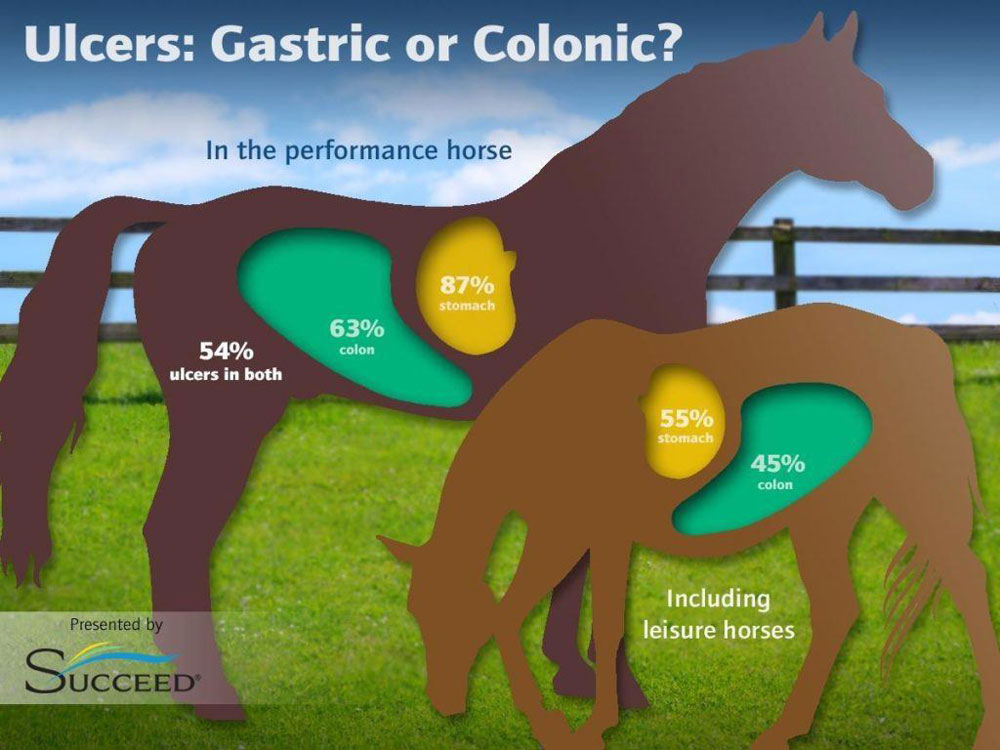
In a study published in the Journal of equine Veterinary Science, 88% of performance horses were found to have stomach ulcers and 63% had colonic ulcers. Almost all the horses - 97% - had some type of digestive tract ulceration.
With the incidences this high, the chances are good that at least one of your horses is suffering from this condition.
The question then is... which one? And how much better could that horse be if it were healthy?
How Digestive Disease Impacts the Horse
Ulcers only represent the most well recognized and understood condition of the equine GI tract.
Colic, whichis ultimately a symptom of underlying disease, hindgut inflammation, parasitism and other conditions are actually more common in horses than you may think.
There are the obvious signs that the horse's digestive health is suffering. These signs can include:Weight Loss
Poor condition
Lack of appetite
Diarrhea
Intermittent colic
Then there are the less obvious signs that are sometimes misattibuted to training, lameness or other problems:Lethargy and dullness
Unwillingness to bend, extend or collect
Stereotypes such as cribbing or weaving
Lack of focus
Intermittent hind end lameness
Individually any of thse signs are cause of concern, together they more clearly signal the external impact of digestive distress in the horse. Horses that are les than health in their guts suffer in their overall well-being and in their ability to train and perform to their full potential.
Test First for Digestive Disease in Horses Much like a thermometer measures temperatyre and a fever indicates the presence of a health problem, the SUCCEED Equine Fecal Blood Test detects occult blood loss that points to damage within the equine gastrointestinal tract.
Because the FBT is simple to use, affordable and non-invasive it's an ideal first step in the diagnosis process for your veterinarian to either rule in the presence of digestive disease, such as gastric ulcers, colonic ulcers, scolitis or other conditions. it is accurate and highly sensitive, particularly for detecting problems in the hindgut.
What Does the SUCCEED Equine Fecal Blood Test Do? The SUCCEED Equine Fecal Blood Test allows veterinarians to begin the diagnostic process by ruling in digestive disease right away when a horse is underperforming, resisting training or showing clinical signs of a digestive problem. Perhaps most importantly, it accurately detects inflammation or lesions in a horse’s hindgut – which previously could only be seen definitively during surgery or at post mortem.
What the SUCCEED FBT Tests For When the mucosal lining of the horse’s gastrointestinal tract is compromised by inflammation or ulceration, it will typically bleed or seep protein into the gut. The SUCCEED FBT detects that blood loss and protein in a fresh fecal sample which can confirm the presence of GI tract disease.
Proprietary antibody technology in the FBT detects the presence of albumin and/or hemoglobin, proteins in blood, in a horse’s manure. Taken together, results for each test indicate the presence of gut damage and can help the veterinarian determine the general location.
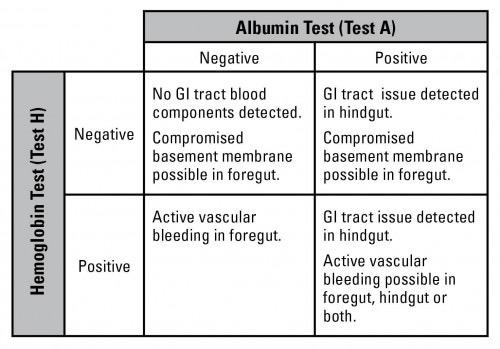 Test A Detects the blood component albumin, which indicates a source in the hindgut.
Test A Detects the blood component albumin, which indicates a source in the hindgut.
Test H Detects hemoglobin, which detects blood loss from sources along the GI tract.
How FBT Results Guide Diagnosis While the test itself is easy to use, understanding what to do with FBT results in light of a full diagnostic work-up requires the skills and knowledge of a trained and certified veterinarian.
Your veterinarian should understand that the FBT is highly sensitive–especially for detecting hindgut conditions–but not specific to identifying the exact pathology behind the condition.
Positive results rule in conditions, but negative results do not necessarily rule out problems – especially lower grade ulcers in the stomach. The FBT provides an initial screen to help guide your veterinarian’s next steps in the diagnostic process. Your veterinarian will combine the FBT results with other diagnostic tests and measures, such as the horse’s history, gastroscopy, blood work or others, for making a complete diagnosis.
How the SUCCEED Equine Fecal Blood Test Works The SUCCEED Equine Fecal Blood test is a simple stall-side test your veterinarian can use at the beginning of a diagnostic work-up to detect the presence of stomach ulcers, colonic ulcers or other GI disease in a horse that is struggling to perform to potential or showing clear signs of digestive issues.
The test identifies components of blood in your horse’s fresh fecal sample, pointing to a problem in the foregut, hindgut or both.
Using Antibodies to Detect Blood Components in Horses’ Feces The SUCCEED FBT is a color change test based on the reaction of antibodies to the presence of equine blood components hemoglobin and albumin. Color lines appear on the FBT strips when albumin or hemoglobin are present at levels that fall within a range carefully calibrated to reflect true pathological conditions.
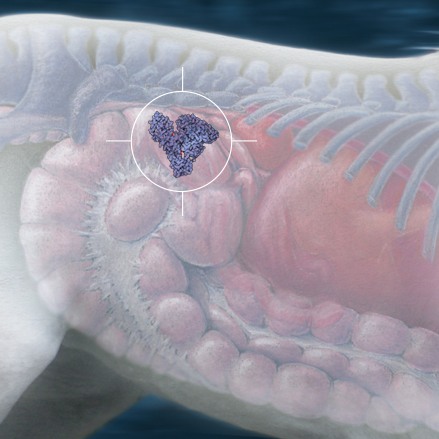
Albumin as an Indicator of Hindgut Injury in Horses Albumin is a protein that is free-floating in blood plasma. While it is present any time there is a bleeding injury, it may also be released through smaller injuries that only seep plasma.
Additionally, albumin is digested by bile and proteolytic enzymes in the small intestine. As a result, albumin present in a horse’s feces would primarily originate from the hindgut.
Thus, fecal albumin is a good indicator of hindgut ulcers.
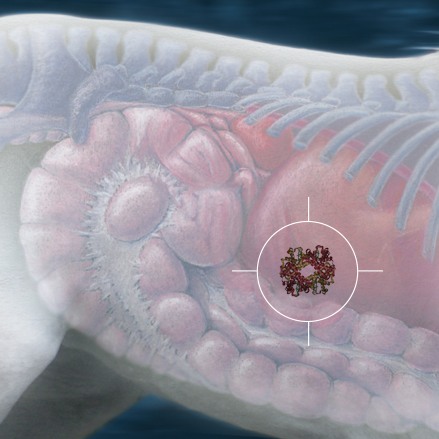
Hemoglobin as an Indicator of GI Injury in Horses As a component of red blood cells, hemoglobin is always present any time there is an injury that produces whole blood. While hemoglobin may be somewhat degraded in the digestive process, it is at a much lower rate than albumin. When bleeding occurs in a horse’s gut, some of the blood is degraded, leaving the rest to move through the digestive tract until it is expelled in the horse’s feces. Therefore, hemoglobin in a horse’s feces could have originated from anywhere within the GI tract.
Hemoglobin is present only with the presence of whole blood. Therefore, a He positive indicates a lesion or condition where active vascular bleeding is occurring.
Science Supporting the SUCCEED FBT Extensive research and testing has gone into the SUCCEED Equine Fecal Blood Test to ensure that it is highly accurate and carefully calibrated to detect true pathological conditions of the equine gut. Additionally, it has been tested by both Freedom Health as well as external research organizations. Ongoing trials have contributed to the continuing improvement of the test, its sensitivity ranges, and its reliability.
Why Test Horses with the SUCCEED FBT? Ulcers, colic and other digestive conditions are not just a problem in someone else's barn- they are likely afflicting horses in yours as well. Competition horses are particularly at risk, and while the effects can be subtle they pose significant chanllenges to training and performance.
The Ulcer Problem is Widespread The harsh reality is that the majority of performance horses in particular suffer from digestive health issues. While most of us are familiar with Equine Gastric Ulcer Syndrome, or stomach ulcers, it was only a few years ago that ulcers were also documented in the horse's colon. It's fairly common knowledge that performance horses are prone to ulcers. But research has shown that any horse is susceptible, even leisure horses.

In a study published in the Journal of equine Veterinary Science, 88% of performance horses were found to have stomach ulcers and 63% had colonic ulcers. Almost all the horses - 97% - had some type of digestive tract ulceration.
With the incidences this high, the chances are good that at least one of your horses is suffering from this condition.
The question then is... which one? And how much better could that horse be if it were healthy?
How Digestive Disease Impacts the Horse
Ulcers only represent the most well recognized and understood condition of the equine GI tract.
Colic, whichis ultimately a symptom of underlying disease, hindgut inflammation, parasitism and other conditions are actually more common in horses than you may think.
There are the obvious signs that the horse's digestive health is suffering. These signs can include:
Then there are the less obvious signs that are sometimes misattibuted to training, lameness or other problems:
Individually any of thse signs are cause of concern, together they more clearly signal the external impact of digestive distress in the horse. Horses that are les than health in their guts suffer in their overall well-being and in their ability to train and perform to their full potential.
Test First for Digestive Disease in Horses Much like a thermometer measures temperatyre and a fever indicates the presence of a health problem, the SUCCEED Equine Fecal Blood Test detects occult blood loss that points to damage within the equine gastrointestinal tract.
Because the FBT is simple to use, affordable and non-invasive it's an ideal first step in the diagnosis process for your veterinarian to either rule in the presence of digestive disease, such as gastric ulcers, colonic ulcers, scolitis or other conditions. it is accurate and highly sensitive, particularly for detecting problems in the hindgut.
What Does the SUCCEED Equine Fecal Blood Test Do? The SUCCEED Equine Fecal Blood Test allows veterinarians to begin the diagnostic process by ruling in digestive disease right away when a horse is underperforming, resisting training or showing clinical signs of a digestive problem. Perhaps most importantly, it accurately detects inflammation or lesions in a horse’s hindgut – which previously could only be seen definitively during surgery or at post mortem.
What the SUCCEED FBT Tests For When the mucosal lining of the horse’s gastrointestinal tract is compromised by inflammation or ulceration, it will typically bleed or seep protein into the gut. The SUCCEED FBT detects that blood loss and protein in a fresh fecal sample which can confirm the presence of GI tract disease.
Proprietary antibody technology in the FBT detects the presence of albumin and/or hemoglobin, proteins in blood, in a horse’s manure. Taken together, results for each test indicate the presence of gut damage and can help the veterinarian determine the general location.
 Test A Detects the blood component albumin, which indicates a source in the hindgut.
Test A Detects the blood component albumin, which indicates a source in the hindgut.
Test H Detects hemoglobin, which detects blood loss from sources along the GI tract.
How FBT Results Guide Diagnosis While the test itself is easy to use, understanding what to do with FBT results in light of a full diagnostic work-up requires the skills and knowledge of a trained and certified veterinarian.
Your veterinarian should understand that the FBT is highly sensitive–especially for detecting hindgut conditions–but not specific to identifying the exact pathology behind the condition.
Positive results rule in conditions, but negative results do not necessarily rule out problems – especially lower grade ulcers in the stomach. The FBT provides an initial screen to help guide your veterinarian’s next steps in the diagnostic process. Your veterinarian will combine the FBT results with other diagnostic tests and measures, such as the horse’s history, gastroscopy, blood work or others, for making a complete diagnosis.
How the SUCCEED Equine Fecal Blood Test Works The SUCCEED Equine Fecal Blood test is a simple stall-side test your veterinarian can use at the beginning of a diagnostic work-up to detect the presence of stomach ulcers, colonic ulcers or other GI disease in a horse that is struggling to perform to potential or showing clear signs of digestive issues.
The test identifies components of blood in your horse’s fresh fecal sample, pointing to a problem in the foregut, hindgut or both.
Using Antibodies to Detect Blood Components in Horses’ Feces The SUCCEED FBT is a color change test based on the reaction of antibodies to the presence of equine blood components hemoglobin and albumin. Color lines appear on the FBT strips when albumin or hemoglobin are present at levels that fall within a range carefully calibrated to reflect true pathological conditions.

Albumin as an Indicator of Hindgut Injury in Horses Albumin is a protein that is free-floating in blood plasma. While it is present any time there is a bleeding injury, it may also be released through smaller injuries that only seep plasma.
Additionally, albumin is digested by bile and proteolytic enzymes in the small intestine. As a result, albumin present in a horse’s feces would primarily originate from the hindgut.
Thus, fecal albumin is a good indicator of hindgut ulcers.

Hemoglobin as an Indicator of GI Injury in Horses As a component of red blood cells, hemoglobin is always present any time there is an injury that produces whole blood. While hemoglobin may be somewhat degraded in the digestive process, it is at a much lower rate than albumin. When bleeding occurs in a horse’s gut, some of the blood is degraded, leaving the rest to move through the digestive tract until it is expelled in the horse’s feces. Therefore, hemoglobin in a horse’s feces could have originated from anywhere within the GI tract.
Hemoglobin is present only with the presence of whole blood. Therefore, a He positive indicates a lesion or condition where active vascular bleeding is occurring.
Science Supporting the SUCCEED FBT Extensive research and testing has gone into the SUCCEED Equine Fecal Blood Test to ensure that it is highly accurate and carefully calibrated to detect true pathological conditions of the equine gut. Additionally, it has been tested by both Freedom Health as well as external research organizations. Ongoing trials have contributed to the continuing improvement of the test, its sensitivity ranges, and its reliability.

